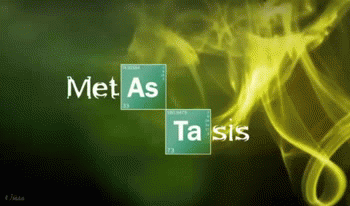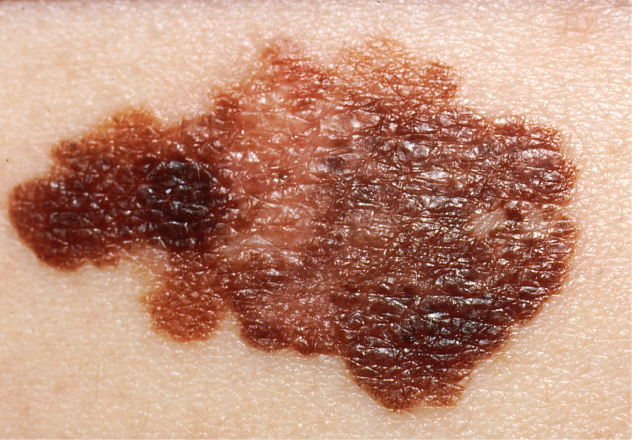Cancer, a term given to cells that grow rapidly and uncontrolled. Not all cancer's are alike and there are a vast number of different cellular biochemical pathways which can malfunction and lead to this sort of uncontrolled growth. Some cancers will grow and form a large tumor, but stay in the same location, while other cancers are more inclined to shoot out cells and spread throughout the body. This process of spreading is known as metastisis (pronounced muh-ta-stuh-sis). Have you ever wondered why certain types of cancer do this? What is the biological trigger?

In an article published January 17th 2017 in the journal Genes and Development titled "Translation reprogramming is an evolutionarily conserved driver of phenotypic plasticity and therapeutic resistance in melanoma," researchers sought to understand this, and did so by studying an aggressive variety of skin cancer known as melanoma.
What is Metastasis?

Takes Deep Breath ...OKAY! When you hear people talking about metastasis what they are usually referring to is the spread of cancer from one location in the body to another (from one organ to a different organ for instance). Metastasis happens only with malignant tumors, as these tumors have unlimited self-growth and tend to invade surrounding tissues spreading their cells.
Sometimes these tumors invade into our circulatory system, allowing cancer cells to travel through blood vessels to a new site (some other organ perhaps...), where the malignant cells can again invade. It is here that the tumor cell(s) can then begin growing into an entirely new tumor (a metastatic tumor).
This new tumor is composed of cancer cells from where it originated, for instance if a brain tumor metastasizes, spreads and a new tumor starts growing in a persons lung. That new tumor is made up of brain cells gone awry, not lung cancer cells, and the tumor that grows there is a metastatic brain cancer rather than lung cancer.
So What About This Article?
If you are a researcher and you want to better understand metastasis and what makes those cancer cells spread out into the blood stream and form the metastatic tumors, then you need a "good" cancer type to study. The variety studied in this publication is melanoma as it is noted for its aggressive nature, and relatively fast progression to metastasis.

Melanoma cancers come in two flavors (and neither are good): those that grow really quickly (they are termed proliferative, because they proliferate aka divide and make new cells a lot), and those that invade other tissues really quickly (termed invasive). It is known that there is a relationship between the type of melanoma and the expression level of a particular gene called MITF (Microphthalmia-associated transcription factor). When MITF is expressed highly then the cells grow quickly, when MITF expression is kept low then the cells spread but grow more slowly.
Glutamine and the MITF gene
The authors of this paper found that when glutamine, a conditionally essential amino acid (conditionally essential means that many cells can synthesize it but not all. Cancer cells including melanoma can not, and require an outside supply) was limited it resulted in a decrease in the expression of MITF in the cancer cells. The expression of MITF was then shown to be able to be restored by placing the cells back into a solution containing glutamine.
Now you should also know that tumors are large, dense masses of rapidly dividing cells. As such these rapidly dividing cells require quite a bit of nutrients from the body to be able to grow (bastards). Now permeation of those nutrients in a tumor is not at all uniform. The center of a melanoma tumor just does not have access to the same amount of nutrients as say the exterior. The center of a melanoma tumor is often low on a few key amino acids, one of those being... you guessed it, glutamine.
MITF is Affected by another Gene called ATF4
ATF4 or Activating transcription factor 4 is a gene (and a protein) that helps cells deal with stress (its involved in a process called the integrated stress response or ISR). According to the authors ATF4 is responsible for regulating other genes that deal with nutrient related stress like say... a lack of glutamine.

Interestingly an increase in the expression of ATF4 that occurs when glutamine is limited results in the decrease in the expression of MITF that we talked about above. If you will also recall, we discussed that when MITF expression is low cells want to spread (aka they want to metastasize). Which means that the metastasis of these melanoma cells, is actually due to those cells response to the stress of lacking nutrients!
TL;DR
When melanoma cells are starved for nutrients (which happens in the center of melanoma tumors) a cellular pathway is activated intended to deal with nutrient related stress. This pathway limits the expression of a gene MITF which is known to correlate to melanoma tumors spreading. The melanoma spreads, when it gets too hungry, which starts from the inside of the tumor.
Sources
- http://genesdev.cshlp.org/content/early/2017/01/17/gad.290940.116
- https://en.wikipedia.org/wiki/Melanoma
- https://en.wikipedia.org/wiki/Metastasis
- https://en.wikipedia.org/wiki/Malignancy
- https://en.wikipedia.org/wiki/Primary_tumor
- http://www.uniprot.org/uniprot/O75030
- https://en.wikipedia.org/wiki/ATF4
- https://en.wikipedia.org/wiki/Integrated_stress_response
All non Cited Images Are Available Under Creative Commons Licenses
Any Gifs Are From Giphy.com and Are Also Available for Use Under Creative Commons Licences
If you like my work, please consider giving me a follow: @justtryme90. I am a PhD holding biochemist with a love for science. My future science blog posts will cover a range of topics in the biology/chemistry fields.
Thank you for your continued support of my work! I appreciate all those who follow me (and those who don't too).
Finally a thank you to @vir for suggestions on improving this post
Understanding cancer will hopefully get us to a cure (in some future). Although this is not my field at all, I like to read about the advances in cancer research.
As others (and actually many those days... cancer seems to be the illness of this century), I have also been affected very recently with cancer (not personally but someone very close). It was exactly the type of cancer mentioned in the article (very invasive and quickly spreading). In this case, it was diagnosed early enough...
Downvoting a post can decrease pending rewards and make it less visible. Common reasons:
Submit
I am sorry to hear about it. Cancer is a terrible thing, and I hope that the treatments in the pipeline work as well as their promice. Hopefully in a decade or two we will have some much better treatments and people's lives will be much improved.
Downvoting a post can decrease pending rewards and make it less visible. Common reasons:
Submit
Very informative! Glad I follow you :D
Downvoting a post can decrease pending rewards and make it less visible. Common reasons:
Submit
I am glad you enjoyed it! :)
Thank you for reading and for your comment. Being able to talk about science with people is the best part of doing this!
Downvoting a post can decrease pending rewards and make it less visible. Common reasons:
Submit
one big promise, at the moment, comes from immunotherapy. more specifically, engineering (modifying) immune cells to target cancers individually. so, sequence the tumor, sequence healthy tissue, collect immune cells, genetically modify them according, put them back in and let the immune system do its job.
Downvoting a post can decrease pending rewards and make it less visible. Common reasons:
Submit
Yeah, I was at a talk ( I think a year or two ago ) by someone doing clinical trials of this technology for one variety of cancer in terminal children who had exhausted all means of treatment. The researcher reported very positive results, so I am pretty excited about it. It doesn't seem, based on what they were talking about that it would be applicable to every single type of cancer, and there are problems with cytokine storms after administration of the modified t-cells as they rapidly attack and kill the cancer cells and this causes other issues. But still the results were very very positive, and I believe many of the children are alive who were involved in the reported experiments.
Thanks for your comment @cristi :)
Downvoting a post can decrease pending rewards and make it less visible. Common reasons:
Submit
So one simply had to "feed" the cancer well enough to prevent a strong expression of ATF4 to keep the normal level of the expression of MITF to prevent metastasis. ;-) Then at least one had only to fight against one big aggregation of cancer cells instead against many small ones.
(Don't take that too serious, I know it won't be easy anyway whatever we try to do.)
Downvoting a post can decrease pending rewards and make it less visible. Common reasons:
Submit
As more pieces of the puzzle get filled in, hopefully we will slowly figure out better possible treatments, yeah. You're right that no matter what direction we go in, its going to be tough work. The complexities of cancer are very very great.
Downvoting a post can decrease pending rewards and make it less visible. Common reasons:
Submit
This was great. I learned something I didn't know about how cancer spreads. One thing I would add is how to pronounce metastasis (e.g. muh-tas-stuh-sis). Words like metastasized can trip people up. I wrote a series on my own experiences with stage III testicular cancer. I didn't find it until the cancer had spread into my lymph system, so I quickly learned about metastasis when I was diagnosed. Since then, I have been fascinated by the science behind cancer. I really enjoy reading posts like this one.
Downvoting a post can decrease pending rewards and make it less visible. Common reasons:
Submit
Thank you for the suggestion, I will add the pronunciation to the document. You are right it is a difficult word to pronounce! :)
I am sorry to hear about your experiences with cancer! It has played a role in my own life (though thankfully to this point not to me directly) however with out going into too much detail, it was my desire to understand it more that led me to choosing science as a profession.
Downvoting a post can decrease pending rewards and make it less visible. Common reasons:
Submit
Cancer really does act strangely compared to our own cells.
Downvoting a post can decrease pending rewards and make it less visible. Common reasons:
Submit
All of cancers actions are properties that our cells have, in the case of cancer though the shackles of biochemical regulation are taken off and things get weird.
Downvoting a post can decrease pending rewards and make it less visible. Common reasons:
Submit
Good work! What do you think of the Gerson Therapy?
Downvoting a post can decrease pending rewards and make it less visible. Common reasons:
Submit
Cancer is largely driven by mutations to genes, which can NOT be reverted by the body (once they are in place it doesn't know that they are there anymore). Thus diet plays little to no role in tumor growth/development. The gerson 'therapy' is reliant on people not understanding the underlying causes of cancer. It likely has cost many people their lives.
Diet is where you work to prevent your self from developing cancer. Once you have it however, it will need treated through other means.
Downvoting a post can decrease pending rewards and make it less visible. Common reasons:
Submit
Gerson has many documented cases from what I understand. Of course it is all nutrition.
Downvoting a post can decrease pending rewards and make it less visible. Common reasons:
Submit
Snake oil. Everything he proposes is false, and will result in loss of life faster than necessary.
Downvoting a post can decrease pending rewards and make it less visible. Common reasons:
Submit